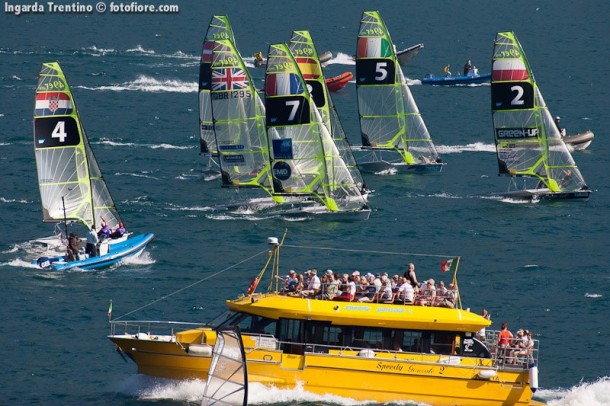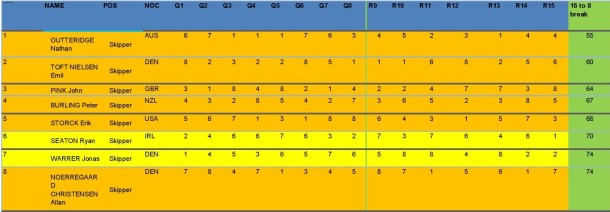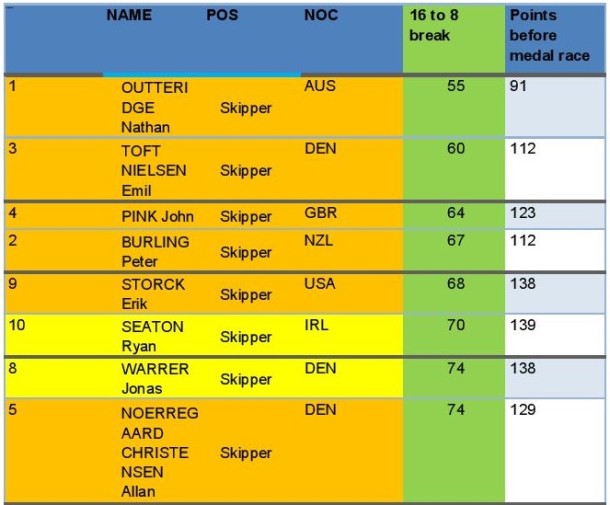Olympic sailing formats are being thoroughly investigated and tested in 2013. The timing is fantastic, as the first year in any quad is the only one with any sort of freedom from the pressures of Olympic qualifying. If sailing can do a good job then the changes can be implemented in time for Rio 2016 and sailing can work to gain a stronger grip on security within the Olympic program.
Two paramount goals have emerged as the cornerstones of sailing.
- The randomized effects of racing in a fleet and the weather requires multiple races over multiple days in order for a worthy champion to emerge.
- The sporting public wants to watch a champion emerge in front of their eyes and the cameras.
This post is titled Formats, Finals and Points, as points is the intersection of these two aims. The medal race finals has been with sailing since the 2008 quad. The medal race, however, is little more than a schedule change with a title, implemented in isolation from the rest of the format discussion. It is a finals only in the meaning that it is the last race but is not a finals the way the sporting world thinks of a finals as an event where the challengers win a competition. The medal race has served it purpose of creating an opportunity for the press to attend, but has only partially delivered on what a final really is.
That is why the 49er class and ISAF are focusing on finding a format that can deliver more.
There are broad options within sport:
- A series of cumulative scores, think Golf, bobsled, sailing, or slalom skiing
- A tournament, think match racing, the world cup of soccer, march madness, or the 100 meter dash
- A single race, think marathon, triathlon, Vende Globe, or long distance swimming.
- Judged sports, think diving, figure skating, or synchronized swimming.
I’m going to discount judged sport for sailing as there seems to be no support, basis, or history of it. I’m also not going to discuss having a single race. There is lots of history within sailing for long distance racing. For the 49er class, however, with no room for safety equipment on board and no love for beach starts, there is little interest in pursuing a long distance point to point race.
That leaves two more options, a tournament, like match racing 2012 delivered or a series, like we normally associate with inshore and Olympic sailing. The 49er class is experimenting with a tournament format at the British Grand Prix this summer. If Theatre Style sailing is embraced by the class it is easy to see how a tournament can work. The great benefit of a tournament is that it is easy to deliver a true finals. In our case, 8 boats will go into a final series where a winner will emerge in front of the fans.
Tournaments do deliver on the principle of using multiple races and multiple days, but, in the end, it is what happens on the final day in the conditions of the final day that determine the medals. It’s a big step to take, and that is why the class is trying it at smaller and more focused regattas than at bigger events in 2013. The sailing world was shocked by some of the results in the 2012 match racing, as many of the favorites fell to the wayside. I would argue that the public really enjoyed the spectacle, but some of the team managers, a risk averse bunch who instruct the MNA’s, are not comfortable with so much being at stake every day in a regatta.
The Series remains a popular option for sailing, and for good reason. Over the course of many races, and many days, the most reproducible results emerge, as it rewards strong boats speed, consistency, and conservative racing principles. Over a longish period of time this format delivers order from the chaos of fleet racing. A championship series now is usually 5-7 days long, longer than golf, longer than cricket, though isn’t even close to length of the tour de France.
So back to the Points, the racing scores that keep track of who is winning. They help us deliver on producing a worthy champion, but do they help us to showcase our champions emerging to the public? Here lies the challenge. If we want a long series, how do we make sure things are still close enough at the end for the public to care when we ask them to watch our finals? For the most part, sailing has not gotten this part right. In medal races, it is rare for the regatta to be at stake. Roughly 50% of the time the Gold medal is already decided by the final race, and incredibly rarely is the medal race still a fleet race, where multiple boats are competing for the championship. These medal races have turned into match races within fleet races, where often the person in 2nd looses out on a medal completely as they are match raced to the back of the fleet to guarantee the gold for a sailor that doesn’t have to defend to places 3 and 4. It can be entertaining, but it’s not fleet racing.
So what options are available to keep the points closer, and how does that effect the regatta:
- Do nothing – This has been the status quo for sailing over the past 8 years+. In the 49er class, looking back through 12 Olympic, World, and European championships, only 1 championship had 2 teams within 5 points of each other going into the final day. In the rest were either out of reach or had only 1 team more than 10 points back of the leader.
- Set scores to finals. The 49er class did this at the 2012 Europeans and the kitesurfers have been using this option for some of their finals. Teams took their places forward only in to the finals. This was felt to be unfair by some, though certainly delivered on an exciting finals. One issue is that it culls the reward for a team who does extremely well during the week.
- 1/2 the points. Though never done to my knowledge, one option is to have a long series of scores, and then simply divide by 2 before the finals. This is the same mathematically to doubling the weight of the finals scores except that the manipulation is done before the final day so the final day leaderboard has the simplicity of 1 point per boat.
- Reduce the number of races. This has been proposed already for the 2016 Olympic regatta, and is up for discussion. For every race removed, the teams get closer on average with their scores and the value of the races in the finals increases. It also directly contradicts the stated goal of using many races and many days to produce a worthy champion.
- Weigh the final race more. This has been done and is also one of the proposals in the mix for 2016. The medal races have been double points weighed since 2008, though with a fleet at only 10 boats there is a natural limit to how much impact this can have. The AC 45 series did this as well with a high point scoring system. It always feels a bit ‘cheap’ however, and removes the natural simplicity of 1 point for every place in a race.
- Cull some races. This has been done frequently, and is being used in the 2013 Palma regatta. It is most frequently put into place when there are split fleets (qualifying moves to gold and silver fleets). Teams will often take their placing from qualifying only though to the gold fleet. Many people will tolerate this format but it does not serve a regatta well as multiple days of fair and good racing can be thrown out. At events like the Olympics, or in Palma with fleets that are not split, it does not work at all. Miami had races at the beginning of the week thrown out of the series scores for races at the end of the week. The only justification for this is to keep scores close, but worse than being ‘cheap’ or artificial, it actually feels preferential, like some teams are mathematically favored by a format, in retrospect.
- Eliminate the eliminated race scores. This is a new concept being discussed by the 49er Format Committee. The basic concept is when a fleet changes size (say from qualifying to gold fleet, or from gold fleet to the finals, all of the scores of those teams who are eliminated get removed from the scoreline. So if a team that is eliminated came 2nd in a race, their 2 is removed, and the team in 3rd moves up one to only score 2 points (assuming they are still racing). In an 8 boat final, every race of the regatta would have those 8 teams ranked 1-8 in each race, with all the boats that had been mixed in removed. There are a number of benefits to this form of score manipulation:
- Every race, at every stage of the regatta counts equally.
- The number of days and number of races need not be decreased for reasons of making the finals relevant
- An exceptional performance by a team will be rewarded as such with a large lead.
- It makes very little difference when moving from qualifying to gold fleet from how it is done now (deemed fairly) except all race scores can be kept.
- The simplicity of 1 point per boat can be kept throughout.
- How top teams perform against other top teams is what determines the winner, not boats who are down in the fleet.
- It is mathematically likely to have multiple boats in contention to win the finals even when a fleet races 9-16 races.
- It works with any size fleet over any length of regatta.
- The scorelines look normal to a viewing audience.
As I mentioned earlier in this post, the 49er class has a lot of experience of finals that have little at stake. This is in part because we like to race more shorter races than most other classes. Here is a breakdown of all the point scores of our championships. :
Here’s a look at the 2011 worlds in Perth going into the final with manipulated scores so that all eliminated teams scores are removed :
And here is the comparrison to the scores as they were with the status quo.
Here are my observations:
a) The places are mostly the same. It is pretty much the same people going into the final in pretty much the same order.
b) Nathan still holds a stong lead. If we were going to do 3 theatre style races to add to these points, his 5 point lead is very significant given that there can only be a maxumum swing of 21 points (nathan 8 someone else 1st) in 3 races.
c) Those scores going into a final would make for great viewing!
The 49er class will be putting out a parallel scorecard for the Palma regatta to show how this form of score manipulation could be the one that allows sailing to have it’s cake and eat it too. If we can race many races over many days and still have an exciting finals, the sport will be in a great place!









